[smbtoolbar]
My main goal as a presenter is to provide the audience with practical applications of research findings. Every year, more and more research articles are published that can enrich our practice. However, there remains a gap between the evidence presented and the real world. My role is to find the connections among many research materials, and link them to everyday application in clinics, in school, at home and in the community. Below are select topics where I have successfully made evidence applicable to our practice.
Contact me at cvialu@gmail.com to learn about other topics or to customize one for your team. You may also review www.seekfreaks.com to explore my other areas of expertise. You can also visit www.applyebp.com to find upcoming evidence-based continuing education workshops. One may even be near you.
Everything’s Measurable! ICF-based Approach to Pediatric OT & PT Assessment
- Description: Everything’s Measurable! is a highly-interactive workshop on the assessment of children and youth with neurologic, orthopedic and developmental disabilities, 3-21 years old. The speaker will highlight the advantages of using the International Classification of Function (ICF) as a framework to guide the assessment process. Participants will learn the psychometric properties, statistical norms, and interpretation of tests and measures covering the different domains of the ICF: personal factors, environmental factors, participation, activity, and body structure & function.This workshop will cover 60+ standardized and non-standardized tools. The speaker will also highlight the use of free, functional, and easy-to-use tests for participation, personal factors, arm function, gross motor function, wheelchair mobility, and body structure & function.Everything’s Measurable! includes hands-on laboratory for participants to practice administration and scoring of tests – activewear is recommended! The speaker will illustrate the proper selection and utilization of tests and measures in determining the need for therapy services, designing intervention, and monitoring outcomes in various practice settings (i.e., home, clinic, hospital, and school). Case studies will be used to gauge and facilitate the participants’ realization of the workshop objectives.
- Audience: Pediatric OTs, PTs, COTAs, PTAs
- Format: 2 Full days
For Good Measure! School-based Tests and Measures in 15 minutes or Less
- Description: This highly interactive workshop will bridge the gap between tests and measures and their applicability in the schools. The speaker will present pediatric tests of motor control, arm function, balance, endurance, wheelchair operation, and mobility which are functional, require minimal materials, and can be completed in 15 minutes or less. The most current literature will be presented to ensure reliable administration of these tests, provide statistical norms or small-group averages, and guide interpretation of test results.
- Audience: All tests are applicable for school-based PTs, many tests are applicable to OT
- Format: Full or half day
4 Pillars of School-based PT Assessment
- Description: This workshop presents the unique combination of considerations for completing a school-based PT assessment, which includes: the Elements of Patient and Client Management (APTA); the International Classification of Function (ICF), the Individuals with Disabilities Education Act (IDEA); and, state and school district policies and guidelines. Assessment tools, such as an ecological assessment and standardized tests and measures will be discussed. Participants will learn how to write a cohesive report, and the tell-tale signs of writing functional goals, versus impairment or treatment goals.
- Audience: School-based PTs; IEP teams and school administrators
- Format: Full or half day
Start with the End in Mind: Prognostication & Backward Planning for Pediatric Therapists
- Description: This workshop offers a concrete and practical approach to prognosis and long-term planning for pediatric practice. Participants will learn to explore prognostication factors for students with disabilities. The presenter will demonstrate prognostication strategies by finding links among the most current literature, the mandates of IDEA (for school-based therapists), and the child’s level of home, community and school participation. Effective planning for home, community, school and post-school outcomes will be discussed by applying the concepts of backward planning, episode of care and critical period of skill acquisition.
- Audience: Pediatric OTs and PTs
- Format: Full or half day
I Can and I Will! Self-determination Strategies for Children and Youth with Disabilities
- Description: This workshop will discuss the role that therapists and educators can play in fostering the development of self-determination skills across the lifespan. The speaker will share specific strategies, as well as online resources that therapists and educators can integrate into their current interventions when working with children and youth with mild to severe disabilities. Free assessment tools will be discussed to monitor improvements in self-determination.
- Audience: Pediatric or school-based OTs, COTAs, PTs, PTAs and SLPs; Teacher, teacher aides, and school or clinical administrators
- Format: Half day
OT, PT and SLP Contributions to a Student’s Successful Postsecondary Transition
- Description: This workshop will present the roles of related services in the student’s transition to adulthood. The speaker will present the importance of transition services to students with disabilities, and present a timeline of services that can help a student prepare for a successful transition. Completion of a student’s transition plan via an IEP that focuses on the student’s goals for independent living, community participation, postsecondary education and employment will also be discussed. Finally, the presenter will describe the role that OTs, PTs and SLPs can play in the creation of the IEP, establishment of transition goals, and the provision of interventions that will help the student achieve such goals.
- Audience: School-based OTs, PTs and SLPs; IEP team members and school administrators
- Format: Half day (Pairs well with I Can! I Will!)
Train the Brain! Motor Learning Principles to Promote Neuroplasticity in Children and Youth with Disabilities
- Description: Generalization of skills allows the child to succeed in their various occupations as a student, a peer, and a member of the family and the community. What treatment approaches have been shown to facilitate generalization?The brain is a dynamic organ that is capable of changing throughout the lifespan in response to internal and external stimuli. Termed neuroplasticity, the brain’s ability to change is linked to the learning and generalization of motor skills. Adherence to motor learning principles (MLPs) has been shown to facilitate neuroplasticity and, thus, generalization. However, initial research on motor learning focused on adults, especially athletes. Since children are not merely “little adults,” there has been questions about the applicability of MLPs to children and youth with disabilities.Training the Brain! will provide the latest evidence in utilizing MLP as they apply to children. The presenter will discuss the research findings and rationale behind such principles as the provision of verbal instruction, demonstration, feedback, variability, reducing difficulty, frequency, specificity, self-controlled practice, motor imagery, whole vs. part practice, and salience. The presenter will translate these evidence into the real-life practice of pediatric OTs and PTs. The presenter will explain the use of MLPs in addressing home, community and school goals. Participants will learn how to incorporate these principles in the individual with disabilities’ therapeutic intervention. To maximize the benefits of MLPs, the presenter will promote the increase of opportunities for practice of motor skills during their daily routine at home, in the school and the community. To this end, participants will also learn how to collaborate with families, caregivers and educators to design a motor-learning-principle-rich home, community and school environment.
- Audience: Pediatric OTs, COTAs, PTs, PTAs, & APE teachers
- Format: Half day or full day.

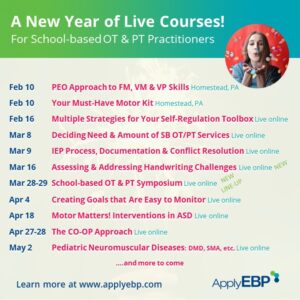

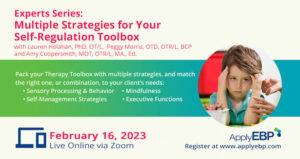
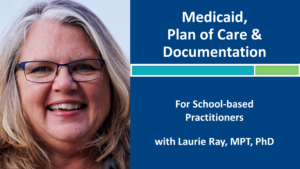
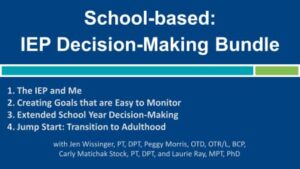
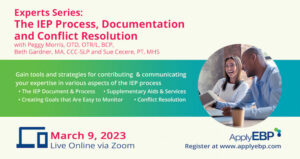
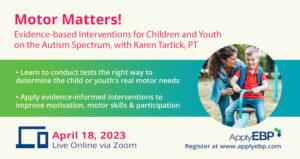
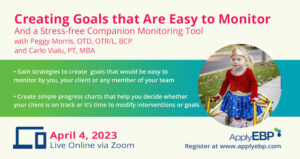
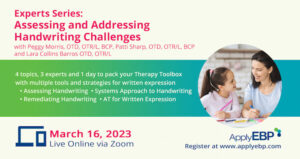
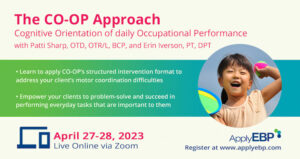
February 23, 2021 at 2:58 pm
I would love more information on these educational opportunities